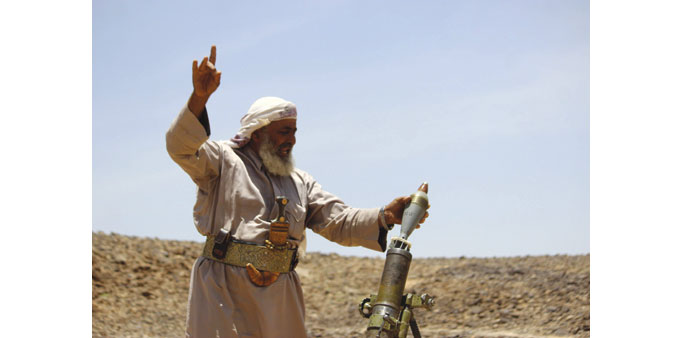UN co-ordinator Johannes van der Klaauw warns that import inspections are hampering access for vital goods
AFP
Sanaa
The United Nations humanitarian co-ordinator for Yemen called yesterday on the Saudi-led coalition against Houthi rebels in Yemen to simplify import inspections, warning they were blocking vital commercial goods and aid.
UN agencies are rushing to bring aid into Yemen and distribute it around the country amid a five-day truce, which began late Tuesday.
But UN co-ordinator Johannes van der Klaauw warned that the import inspections, introduced under an arms embargo slapped on Iran-backed Houthi rebels last month, were hampering access for vital goods.
“The arms embargo and its inspection regime results in commercial goods, be it by air or by ship, no longer reaching the country,” he told journalists in Geneva via conference call from Yemen.
“The current inspection regime needs to be simplified, needs to be faster so that commercial, but also humanitarian imports of fuel (and) food and other life-sustaining necessities can resume,” he said.
The UN Security Council slapped the arms embargo on the Houthi rebels last month, after they captured the capital Sanaa and advanced on the southern city of Aden, forcing President Abd-Rabbu Mansour Hadi into exile.
Van der Klaauw stressed that getting more fuel into conflict-ravaged Yemen was essential, not only for transporting aid around the country but also to keep fuel-guzzling generators humming in water stations and hospitals.
“Unless additional fuel is made available in the next few weeks ... hospitals will shut down, water and sanitation systems will come to a halt, telecom services will end, power supplies will be cut across the country,” he said, pointing out that in Yemen “there is no electricity, everything works on generators that need fuel.”
Van der Klaauw hailed the so-called humanitarian pause, which he said seemed to be holding despite localised and temporary skirmishes.
Some 1,600 people, many of them civilians, have been killed since the violence erupted in late March and more than 6,200 others have been injured.
The pause, he said, was providing “essential respite to the civilian population to get out of the conflict zone, to have some breathing space, to have access to services”.
“It also allows us to remove the dead bodies and then evacuate the wounded and allow for critical medical treatment,” he said.
The UN refugee agency said yesterday that the first of six planned flights into Yemen carrying urgently needed aid had landed safely.
The supplies, including blankets and sleeping mats, “will help alleviate the tough conditions for tens of thousands of desperate civilians wrenched from their homes as a result of the escalated conflict”, Charlotte Ridung, UNHCR’s assistant representative in Yemen, said in a statement.
UNHCR said yesterday that some 450,000 Yemenis had fled inside the country since late March, joining some 330,000 people already internally displaced inside Yemen.
Some 250,000 Somali refugees in Yemen have also been impacted by the fighting, while around 29,000 people have fled to neighbouring countries, UNHCR said.
The ceasefire appeared to be mostly holding yesterday despite heavy ground fighting between local militiamen and the Houthis in the city of Taez, residents said. A medical source said 10 were killed.
In the city of Dhalea residents also reported clashes yesterday but there was no information on casualties.
“Nothing has changed with this truce. People are still fighting and the Houthis are still in control,” said Alawi al-Afouri, a resident in the southern city of Aden.
“The legitimate Yemeni government is scattered abroad and has no authority inside.”
Meanwhile, tribal sources said yesterday Houthi fighters have withdrawn from the border area between Saudi Arabia and Yemen.

A fighter loyal to Yemen’s President Abd-Rabbu Mansour Hadi fires a mortar shell during clashes with Houthi rebels in the area of Jaadan, in Marib pro
